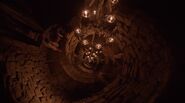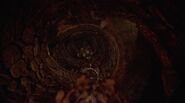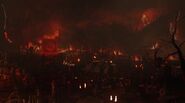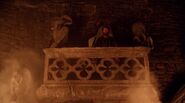| “ | You find me fully prepared to burn like a human candle for eternity in a pit of burning black tar with all the other damned. | ” |
— Cotton Mather about Hell
| ||
Hell, also known as the Underworld, is the kingdom of the damned that is hidden deep within the earth and is ruled by the Devil.
Description
| “ | Most of those who have ever lived are now dead. All but very few must surely burn in Hell. We may someday over-people this vast, empty new land, but I fear that we have already over-peopled Hell. So that, as it is written in Isaiah, "Hell hath enlarged Herself." | ” |
— Cotton Mather about Hell
| ||
According to Cotton Mather, the belief that Hell is completely made of fire is a common misconception and is actually a world of black tar that burns hotter than earthly flames. It was created by the Abrahamic God to imprisoned the angels that rebelled against him. The Reverend also stated that there are more souls in Hell than there are in Heaven. Cotton explained to John Alden that every man, woman and child has committed sins, and for these sins, everyone will be judged and punished. Hell is a place of eternal damnation and suffering, made of black tar, flames and red-hot lava.
Personal Hell
Widespread belief proven by those who have been to Hell and back, like Increase Mather, it is the existence of personal hells. According to this belief, every soul damned to Hell experiencing eternal punishment according to the law of retaliation: suffer the oppression inflicted to others in life. Increase Mather, for example, he was constantly tortured by beings identical in appearance to him.
This belief, however, doesn't explain how Tituba's hellish fate shows her deprived of voice and caged in a slave ship, as this does not follow the law of retaliation, but it's her worst period of life. Since Tituba's fate is uncertain, it is possible that this is her metaphorical Hell, seen as her greatest fear.
Retconned beliefs
- Below a set of beliefs mentioned in the first season, refuted/contradicted in the third.
While the basis of Hell remain a mystery, contrary to religious belief, not all souls suffer in the Underworld. For many souls, especially those of witches, life in the Underworld is considerably pleasant. According to Increase Mather, after he touched Hell, the boiling black tar scorched his flesh to the point that years later they still stung. However, during the Witches' Sabbath to commence the Grand Rite, Isaac Walton and John Alden witnessed numerous witches dancing and playing and swimming in tar without fear or pain. This implies that while Hell is painful towards those who oppose the Devil, Hell is pleasurable towards those who support him. According to Mary Sibley, Hell is not a world of pain and suffering, but an end to it. Mary explains that the Hell that is taught in biblical scripture is a barbaric lie created by the Christian rulers as a means to use fear and manipulation to turn the nations away from the Old Ways and submit to their biblical God. Mary further explains that the miserable and painful "Hell" that is taught in Christianity is not the true Hell that follows death, but the strict and tyrant world being created by the Puritans. It is because of this joyless world being created by the Puritans that for the last five hundred years, witches have attempted to complete the Grand Rite as a means to eradicate the Puritans and create a world free of their violent hypocrisy and oppression.
Hell Gates
- Main article: Hell Gate
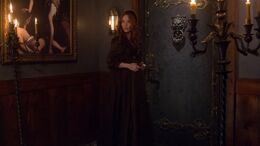
Anne in front of the Hell Gate
Thresholds for Hell are mystical places marking the border between the horror of the world of the living and the unspeakable atrocities hidden in the deepest Hell gorges. A rare and brief Hell Gate is opened thanks to the sacrifice of many victims, whose carcasses are turned into Hell-blood during the last stage of the Grand Rite, to allow the rise of Satan on Earth.
The most important Hell Gate, however, is the one created by the Devil himself, meant to be open on the verge of Black Sunday, to complete the Great Terror. It is a door that leads directly to Hell through a stone spiral staircase leading to the center of the earth. These Hell Gates can be crossed by living people, as proven by both Dr Samuel Wainwright and by Cotton Mather, respectively through hell-blood pool, and doorway.
In History
The modern English word Hell is derived from Old English hel, helle (about 725 AD to refer to a nether world of the dead) reaching into the Anglo-Saxon pagan period. The word has cognates in related Germanic languages, were the term was used to describe the Underworld ruled by a being named Hel, described in the Poetic Edda as a daughter of the the trickster god Loki. The pagan Hell, and especially the Norse one with which the Christian's Hell shares the name, has nothing to do with the Abrahamic religion concept of Afterlife. The word was used to transfer a pagan concept to Christian theology and its vocabulary (however, for the Judeo-Christian origin of the concept see Gehenna).
Hell appears in several mythologies and religions. It is commonly inhabited by demons and the souls of dead people. A fable about hell which recurs in folklore across several cultures is the allegory of the long spoons. Hell is often depicted in art and literature, perhaps most famously in Dante's Divine Comedy.
Memorable Quotes
- Mary Sibley: Oh, I've already offered up my soul to Hell. You, on the other hand, must have been terribly surprised to find yourself consigned there.
- Increase Mather: Nothing could have surprised me less. No, I've always gone where all the others, my idiot son included, are too weak to go. I take the battle to the very heart of darkness. I would do it again.
- -- The Beckoning Fair One
- ______________________________
- Mary Sibley: Each man's Hell is as unique as his crimes. What was yours?
- Increase Mather : Mine it is me strapped into my own torture chair, beset by a legion of devils, each wearing my own face, mortifying my flesh with implements far more fiendish than any I could ever have contrived, gripped in hands as scarred as my own. No one can imagine or bear the torments of one's own worst acts.
- -- in The Beckoning Fair One
- ________________________________
- Mary Sibley: They say that those of us who find our Hell on Earth will find our Heaven in Hell.
- -- The Beckoning Fair One
Gallery
Trivia
- According to Mary Sibley, "those who find their hell on earth, will find their heaven in hell." This implies that not all souls suffer in hell. While some souls, such as Increase Mather, hate it there and think of hell as a prison of misery and torment, other souls love it there and think of hell as a paradise of happiness and pleasure.
- Co-creator Brannon Braga said that Hell it’s an actual place and that their vision of Hell was based on the paintings of Hieronymus Bosch. [1]
References
See Also
| ||||||||||||||||||||||||||

